27.07.2023 Survey on the status of MEDUWA innovations
Video from the Province Overijssel about MEDUWA-Vechte
23.09.2021 The Expertise Centre Europe of the Province of Overijssel (NL) has produced a video of the MEDUWA project for its roadshows on the new European programme period (2021-2027) (subtitles in Dutch only).
Online lectures and discussion on biological health risks of wild swimming
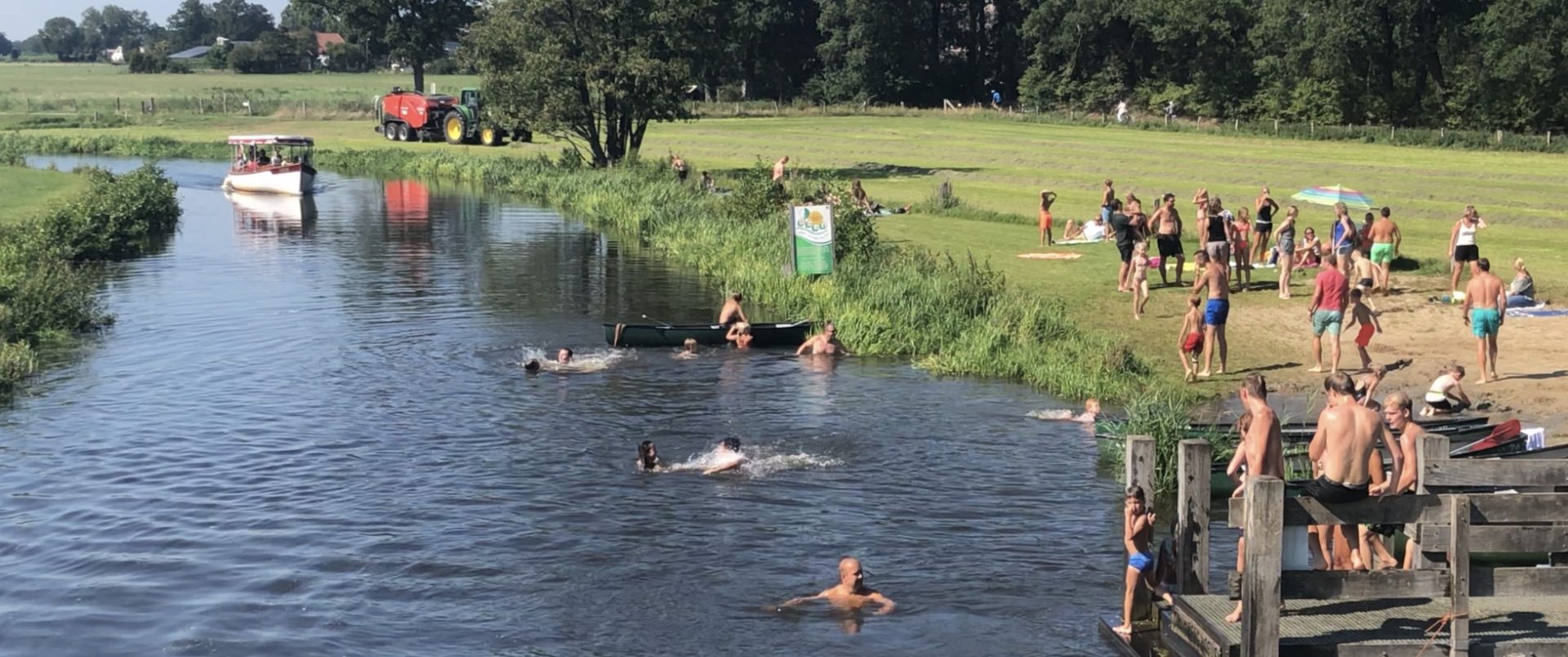
Date: 2 June 2021
Time: 16:00 – 18:00 o’clock.
MEDUWA-Project partner Stichting Huize Aarde presents research data on wild swimming and gastroenteritis in the Vechte watershed.
With contributions by RIVM and H2Oké (in Dutch).
More informationhere.
Online Public Report on the story of MEDUWA-Vecht(e)
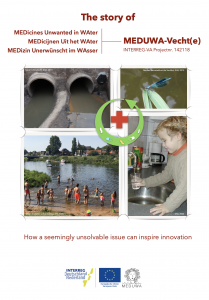
28.04.2021 After 4.5 years of hard work by all the partners in the cross-border MEDUWA-Vecht(e) project, there is much to tell. What have we been doing all these years? What was the goal? What did we achieve and what not? How do we want to move forward? In the story of MEDUWA, you can read about how a seemingly unsolvable issue can inspire innovation.
Evaluation of MEDUWA by project partners published
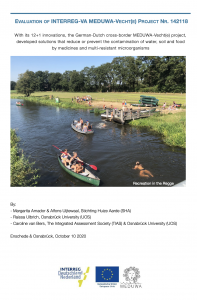
10.04.2021 This report presents an evaluation of the effectiveness, social relevance and management of the MEDUWA-Vecht(e) project from the perspective of the project partners. It provides an overview of the many products the project has yielded, how many jobs have been created and how many (young) scientists have been introduced to the complex subject of the environmental cycle of human and veterinary medicines and antimicrobial resistant micro-organisms. Recommendations for the improvement of the impact and acceptance of the innovations as well as follow-up activities are made. Link to report
EUREGIO interviewed MEDUWA management
07.04.2021 Now that the MEDUWA-Vecht(e) project has come to an end, Carmen van der Sluis from EUREGIO interviewed the project management and reported on their findings. The project managers look back with satisfaction: a great deal has been achieved thanks to the great commitment of the project partners. They also look ahead: the topic of micro-pollutions is complex and requires more international efforts, especially in the context of climate change.
Read the interview here (only in Dutch and German).
Film about “Beyond Technology” online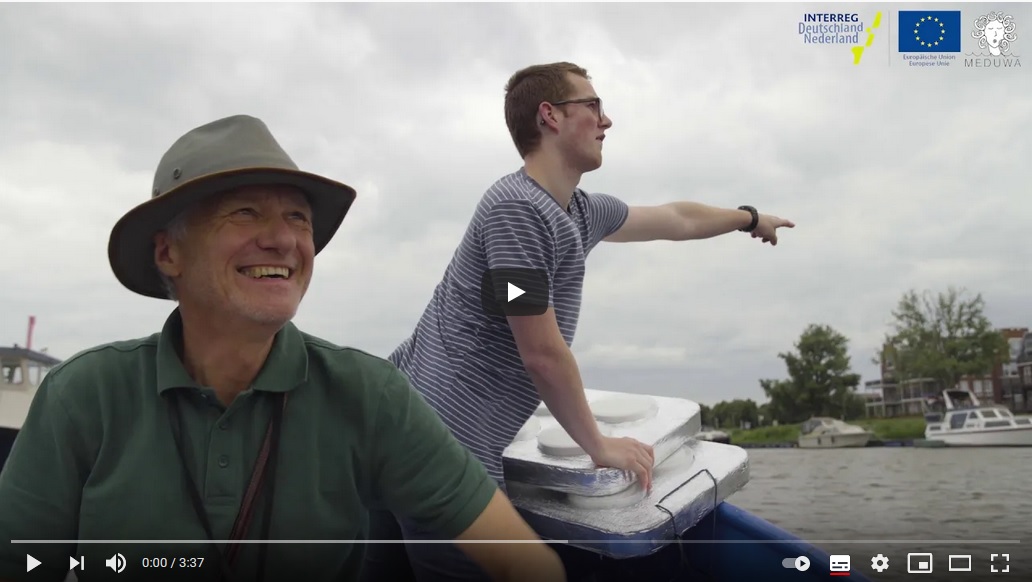
31.03.2021 “Beyond Technology” of ArtEZ University of the Arts, Collective Satellite Group, and University of Twente in the Netherlands, facilitates experiences to stimulate students to learn about the complexity of selected water issues – and to recognize the relationships between water, technology and human behavior. See beyondtechnology.world
Beyond Technology is inspired on MEDUWA-Vecht(e) project.
Film about the MEDUWA-Vecht(e) project online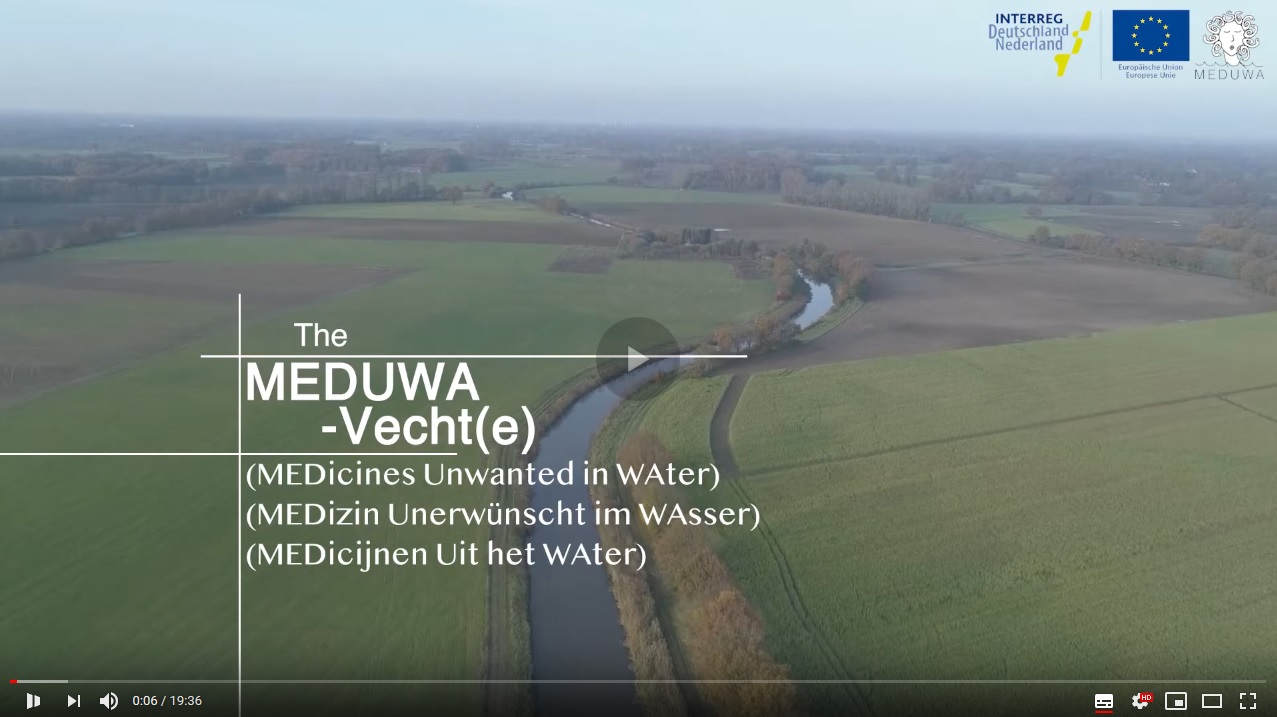
24.11.2020 As of today, the video about the MEDUWA-Vecht(e) project is available on Youtube in three languages (German, Dutch and English). The video gives an overview of the various methods that have been developed to combat the contamination of water, soil, food and air with medicines and multi-resistant micro-organisms. Link: here.
MEDUWinar: Presenting research on approaches and solutions to medicines and microbial resistance in the environment – Webcast on Nov. 24
24.11.2020 The MEDUWA-Vecht(e) project will hold a webcast on Nov. 24 in which the excellent work undertaken by our young researchers will be presented.
Tues. 24 November 2020 13.00-14.30
- Volker Lämmchen, Osnabrueck University, Inst. of Environmental Systems Research, DE: “Modelling of micro-pollutants in a strongly regulated cross-border, lowland catchment”
- Gunnar Niebaum, Osnabrueck University, Inst. of Environmental Systems Research, DE: “Prediction of environmental concentrations of pharmaceuticals in the Vechte River catchment using the GREAT-ER model”
- Daniel Duarte, Radboud University, Environmental Science, NL: “Human and environmental risk assessment of pharmaceuticals in the Vechte river”
For more information on the presentations, slides and recordings see here.
Alloksys Life Sciences BV – Preventing worsening of conditions of COVID-19 patients
14.10.2020 Alloksys is active in the development of alkaline phosphatase (AP), an enzyme, as a drug to prevent complications resulting from major surgery. Its AP-formulation (RESCAP) works by detoxifying inflammation-inducing compounds which are released during major surgery (and by preventing leaky membranes of gut and other organs, see Figure), which often leads to complications such as kidney-failure and other organ problems. Current clinical trials include the use of RESCAP during cardio-surgery and kidney-transplant surgery.
Due to the apparent positive effects which has been found in these applications so far, various doctors have suggested to try RESCAP in COVID-19 patients, as these patients face comparable complications (inflammation, lung-membrane problems, etc.), leading to intensive care uptake with serious complications (lungs and other organs). Alloksys has applied for and received a fast-track approval for a clinical trial on COVID-19 patients in the Netherlands, and is currently preparing for this study, which will compare the development of the disease in hospitalized patients with and without (intravenous) administration of RESCAP.

Mohana Kumari, Europa Ayurveda Centrum, 1945-2020
07.08.2020 It is with sadness that we learned of the death of Mohana Kumari of the Europa Ayurveda Centre. As a partner in the MEDUWA project, she played a central role in the development of the project innovations, the replacement of herbal antibiotics and phytoremediation. Her legacy in the practice of Ayurvedic medicine will certainly be carried forward. On behalf of MEDUWA’s partners, we express our sincere condolences to her partner and husband, Cornelis Peters, her son, Vignesh Peters, and her dear friends and colleagues.
New Grey Water Footprint publication
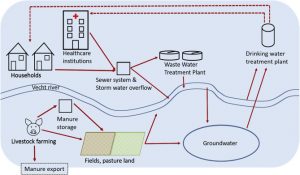
29.04.2020 Read the latest publication by collaborating MEDUWA researchers from University of Twente and Osnabrück University about the Grey Water Footprint of human and veterinary medicines: Wöhler, L., Niebaum, G., Krol, M., Hoekstra, A.Y., (2020): The grey water footprint of human and veterinary pharmaceuticals. Water Research X, Volume 7, 100044. Link to article.
The MEDUWA team would like to acknowledge the following phamacists for their invaluable data contributions and exchange:
– Röpcke-Zweers Hospital Hardenberg; Pharmacist Frank Bruggeman (July 2018)
– Radboud University Medical Centre Nijmegen; Pharmacist Bart van Holsteijn and staff from other sections: Leon Berrevoets, Jesse Sprokholt, Lars Backx, Koopje Toerig, Eric Mimmel (August 2018)
– Hospital Medisch Spectrum Enschede; Pharmacists Eric de Widt and Kris Movig (September 2018)
– ZGT Hospital Hengelo; Pharmacist Michiel Damhof (March 2019)
For further MEDUWA publications find an overview here.
Also Covid-19 patients attacked by fungi
30.04.2020, Nijmegen 20% of the Covid-19 patients is being attacked by fungi/molds. Professor clinical mycology at Radboud UMC Nijmegen Paul Verweij and his team are investigating if this leads to infection.
For information about the spreading of multi-resistant molds and its implications for human health, see the presentation (slides and video) by Paul Verweij at the MEDUWA Stakeholders and Project Partners meeting at Zwolle, February 13 2020 here .
Are multi-resistant fungi a health threat?
20.02 2020, Zwolle By Paul Verweij, professor of clinical mycology, Radboud University Medical Center and Centre of Expertise in Mycology Radboudumc/CWZ (MERC) in Nijmegen, Netherlands.
Azole anti-fungal agents are widely used against pathogenic fungal species, also for humans. Multi-resistance of fungi (moulds/molds) against azoles means that anti fungal agents in humans aren’t effective anymore.
The fungus Aspergillus fumigatus plays a special role in this process. A. fumigatus is not a plant pathogen but grows on decaying plant material and has been found in flower bulb waste, grass and wood chipping waste. There it comes in contact with, and became resistant against, all types of azole fungicides still present on the plant residues. This mold specie can survive in our body because it thrives at higher temperatures.
Humans are exposed to multi-resistant A. fumigatus through air (aerial spores) and food. Persons that have a weak immune system or have an allergy are more prone to having a fungal invasion eg. in their lungs. In combination with influenza, patients are more susceptible to the infection. 20% of the intensive care Influenza patients get infected. About 30% of them have multi-resistant Aspergillus; and half of these patients die because treatment fails.
There is a low level of awareness of this issue. Fungal diseases aren’t considered a public health risk because you need an additional factor like immune deficiency or influenza. Antimicrobial susceptibility testing isn’t done routinely for molds. But antimicrobial resistance (AMR) isn’t antibacterial resistance (ABR) only! There is a need for better diagnostic tests and an international surveillance program that include fungal resistance in one-health programs. In other words, fungal resistance needs to be prioritized.
See here for a video presentation of Paul Verweij and here for the slides.
MEDUWA Declaration 2020 on the Emission of Human & Veterinary Medicines
13.2.2020, Zwolle During the Stakeholder and Partner Meeting in Zwolle, the MEDUWA Declaration 2020 on Emissions of Human and Veterinary Medicines was signed. The aim of the declaration is to stimulate cross-border cooperation between policy makers and policy advisors, researchers and private companies to take action against biological and chemical pollution from medicines and multi-resistant micro-organisms in the environment, which pose an invisible threat to ecology, public health and the economy. The declaration in English, as well as an overview of the signatories can be found here: MEDUWA Declaration
List of signatory parties:
Ina Ebert, Umweltbundesamt
Erik Lievers, Waterschap Vechtstromen
Svenja Starke, Microganic
Janco van Gelderen
Thomas Kock, Weil Wasseraufbereitung
Björn Werdeling, Weil Wasseraufbereitung
K.H. Odink, Waterschap Drents Overijsselse Delta
E.J.I.M.Leenen, H2Oké
Julian Fischer, a tip: tap e.V.
Richard Schlicker, Geoplex GIS GmbH
Frederik Hilling, Geoplex GIS GmbH
Rien de Ridder, Waterschap Zuiderzeeland
Lieneke Stam
Volker Lämmchen, University Osnabrück
Herman Feil, Alloksys Life Sciences
Josephine Deperink, Novaris
Paul Leenders, VitalFluid
Joris de Grooth
Maria Groot
Dick Bijl, ISDB
Cornelis Peters, Europa Ayurveda Centrum
Martijn van Heijningen
Franziska Czernik
Thorsten Kuczius
Paul Scheepers
Martien Graumans
Caroline van Bers, The Integrated Assessment Society
Margarita Amador, Stichting Huize Aarde
Raissa Ulbrich, University Osnabrück
Will Clark, Health Care Without Harm (HCWH) Europe
Walter Oppel, BUND (Friends of the Earth Germany) Kreisgruppe Grafschaft Bentheim
If you would like to become a signatory party, please contact us at: info[at]meduwa.eu
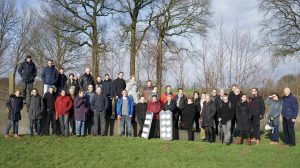
Photo: Stichting Huize Aarde
Stakeholder and Partner Meeting 2020 in Zwolle
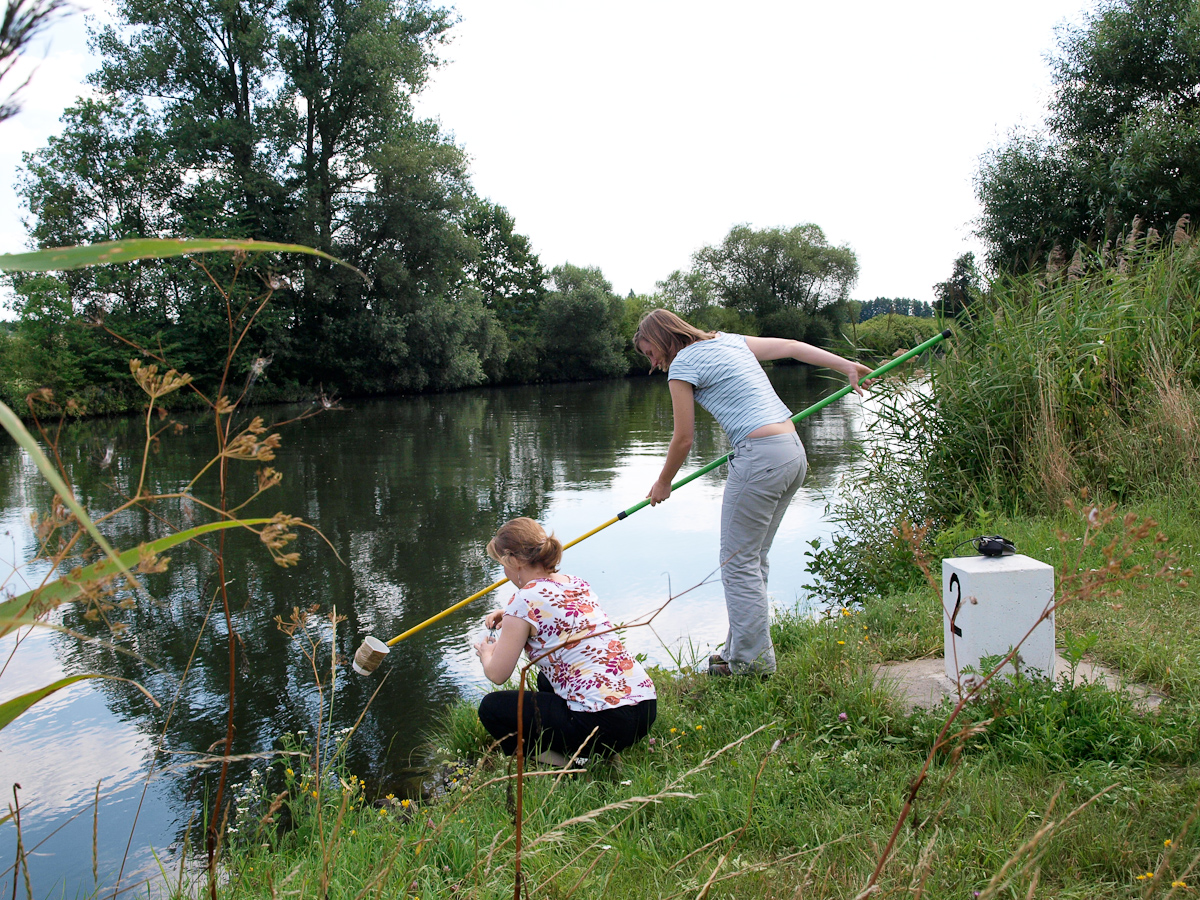
Photo: Jürgen Berlekamp
29.01.2020, Osnabrück/Zwolle MEDicines Unwanted in WAter – Towards the finalisation of the MEDUWA project with a partner meeting in Zwolle – How can medicines and multi-resistant micro-organisms be reduced in the environmental cycle? This is the central question of the cross-border project MEDUWA (MEDicines Unwanted in WAter), which continues until end 2020. On Wednesday, February 12 and Thursday, February 13, the partners of the German-Dutch project will meet in the Hanseatic City of Zwolle (Netherlands) for a final meeting. Read here the Program MEDUWA SH & PP Meeting. The MEDUWA Declaration 2020 on the emission of human and veterinary medicines, which will be jointly signed on 13 February 2020.
INTERREG research on plasma activated water
18.01.2020 Within the INTERREG Germany-Netherlands project MEDUWA-Vecht(e), Martien Graumans, Wilfred Hoeben, Frans Russel and Paul Scheepers studied the effects of thermal plasma-activated water and UV/H2O2 application on medicines in tap water. This innovation is one of several that are part of the MEDUWA project. This project takes a holistic approach to reduce pharmaceutical residues in the environment.
Until now, many sewage treatment plants have not been able to remove medicines out of the sewage water completely and thus release them into the environment. According to the authors, oxidative degradation steps can be an important supplement to the purification of water.
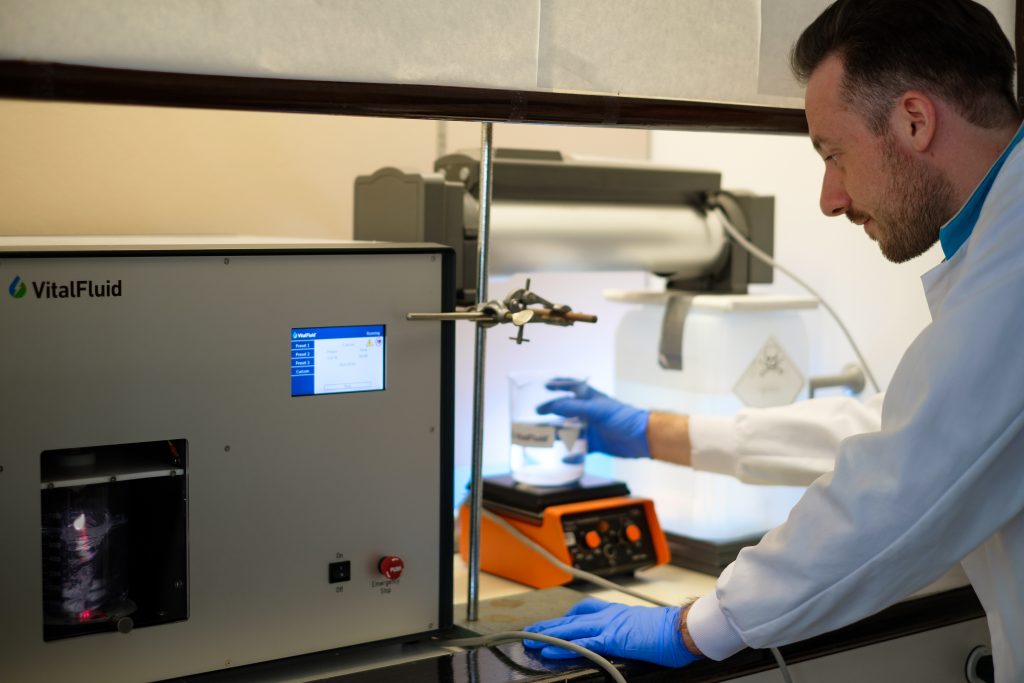
Photo: Martien Graumans
In their research, measurements with thermal plasma activation as well as UV/H2O2 treatment are executed. Both types are applied to the medicine cyclophosphamide and its effects on the reduction of the substance are analysed.
Their research shows that by a specific application of the methods a complete degradation of the pharmaceutical was achieved, and no residues were left. Nevertheless, there is still a need for further research on thermal plasma-activated water to further specify the application.
More information can be found in the current paper Graumans et al. (2020): Oxidative degradation of cyclophosphamide using thermal plasma activation and UV/H2O2 treatment in tap water. Environmental Research, 182: 109046.
MEDUWA Young Scientists at International Conferences
19.12.2019 2019 was a successful and exciting year for our WP1 PhD students. This year is characterized by the active participation of our researchers in various international conferences. It is especially important to spread the MEDUWA approach in research. The GREAT-ER model and a meta-analysis of the frequency of antibiotic resistance genes in the environment or the prognosis of antibiotic residues from sewage treatment plants were presented.
Overview of the different activities of the MEDUWA WP1 PhD students:
- The society of Environmental Toxicology and Chemistry (SETAC) Europe 29th Annual Meeting, May 2019, Helsinki
- Sulfamethoxazole in the Vecht catchment: An application of the GREAT-ER model to assess antibiotic concentrations in whole river catchments, (presentation), Gunnar Niebaum
- Modelling environmental antibiotic-resistance gene abundance: a meta-analysis (poster), Daniel Duarte
- Simulation of Diclofenac concentrations in small German rivers with GREAT-ER, (poster), Volker Lämmchen
- 5th International Symposium on the Environmental Dimension of Antibiotic Resistance; June 2019, York
- iPiE Final Conference; June 2019, Hong Kong
- The society of Environmental Toxicology and Chemistry (SETAC), 24th german-language brand meeting (glb), September 2019, Landau i. d. Pfalz
- Das Vechte Informationssystem – Repräsentation von GREAT-ER Simulationen auf einer Web GIS Plattform, (presentation), Volker Lämmchen
- 2nd International conference on risk assessment of pharmaceuticals in the environment (ICRAPHE), November 2019, Barcelona
- How predictable are pharmaceutical loads in wastewater treatment plant influents and effluents?, (poster), Gunnar Niebaum
- Georeferenced modelling as complementary approach to environmental monitoring, (poster), Volker Lämmchen
Award for MEDUWA PhD student
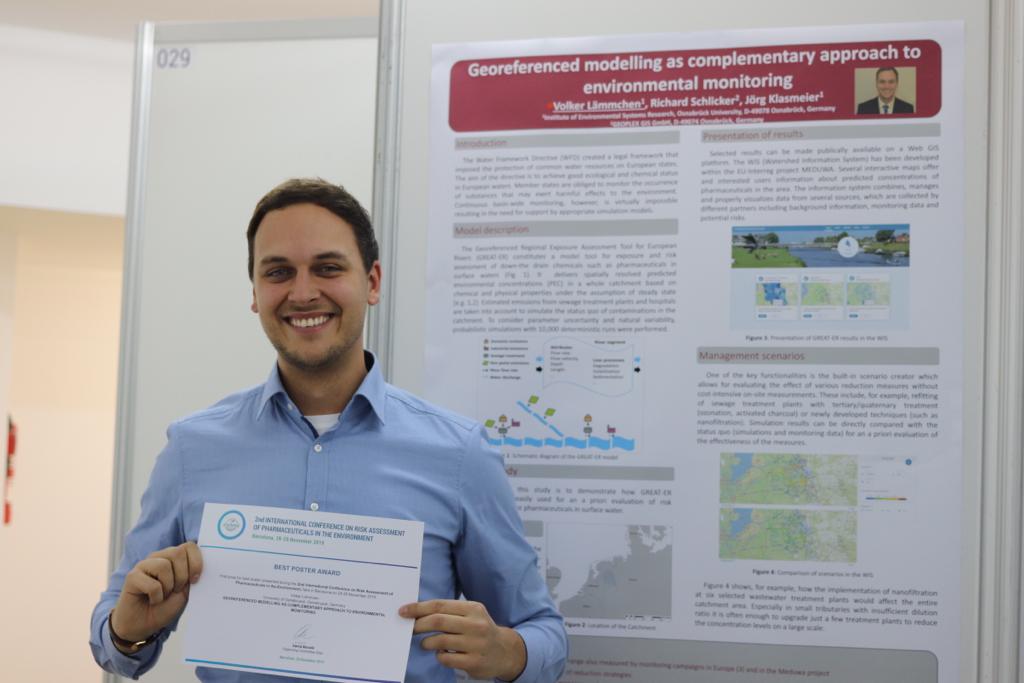
13.12.2019 Congratulations to our PhD student Volker Lämmchen! He received an award two times this year. Last month in Barcelona he was honoured with the ICRAPHE Young Investigators Award. The topic of his poster was “Georeferenced Modelling as Complementary Approach to Environmental Monitoring”. In September he also achieved 2nd place at the SETAC GLB in Landau. The focus of this presentation was “The Vechte Informationssystem: Representation of GREAT-ER simulations on a Web GIS platform”.
We are very glad that the WIS of our MEDUWA project is recognized in the international scientific community through the hard work of our scientists.
Dutch-German cooperation for analysis of bacterial contamination of Lake Vechte
09.12.2019 Within the EU INTERREG-project MEDUWA the Institute for Environmental Systems Research (Osnabrück University) has taken numerous water and sediment samples at Lake Vechte together with the European Centre of Excellance for Sustainable Water Technology (WETSUS, Leeuwarden/NL) on 2019, October 16th. Participating were PhD students Volker Lämmchen and Gunnar Niebaum, GIS-expert Dr. Jürgen Berlekamp and project leader Dr. Jörg Klasmeier (all Osnabrück) as well as WETSUS colleagues Bianca de Vries and Alicia Bornemann.
Sampling in the river Vechte (lake inflow and outflow) and in the lake itself was performed from a canoe. Physico-chemical parameters such as pH, conductivity and oxygen were measured in situ. Water and sediment samples were filled in glass bottles and transported to the WETSUS laboratory for analysis of E.coli and resistant E.coli (ESBL). The project team expects important information on the occurrence, input pathways and the function of lakes related to the bacterial contamination in river systems from the analytical results. The findings will be incorporated into model simulations of the bacterial contamination of the whole Vechte basin.
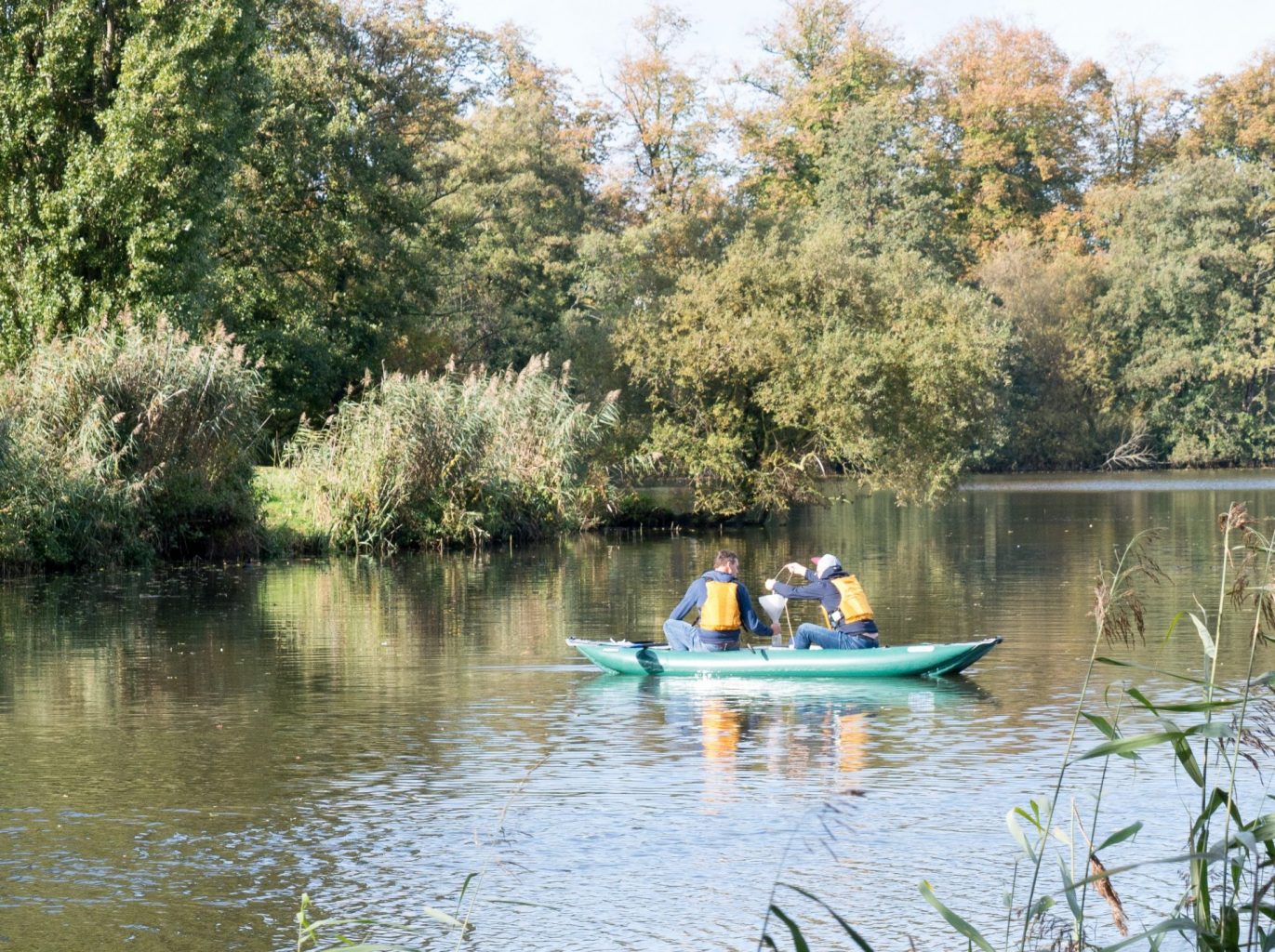
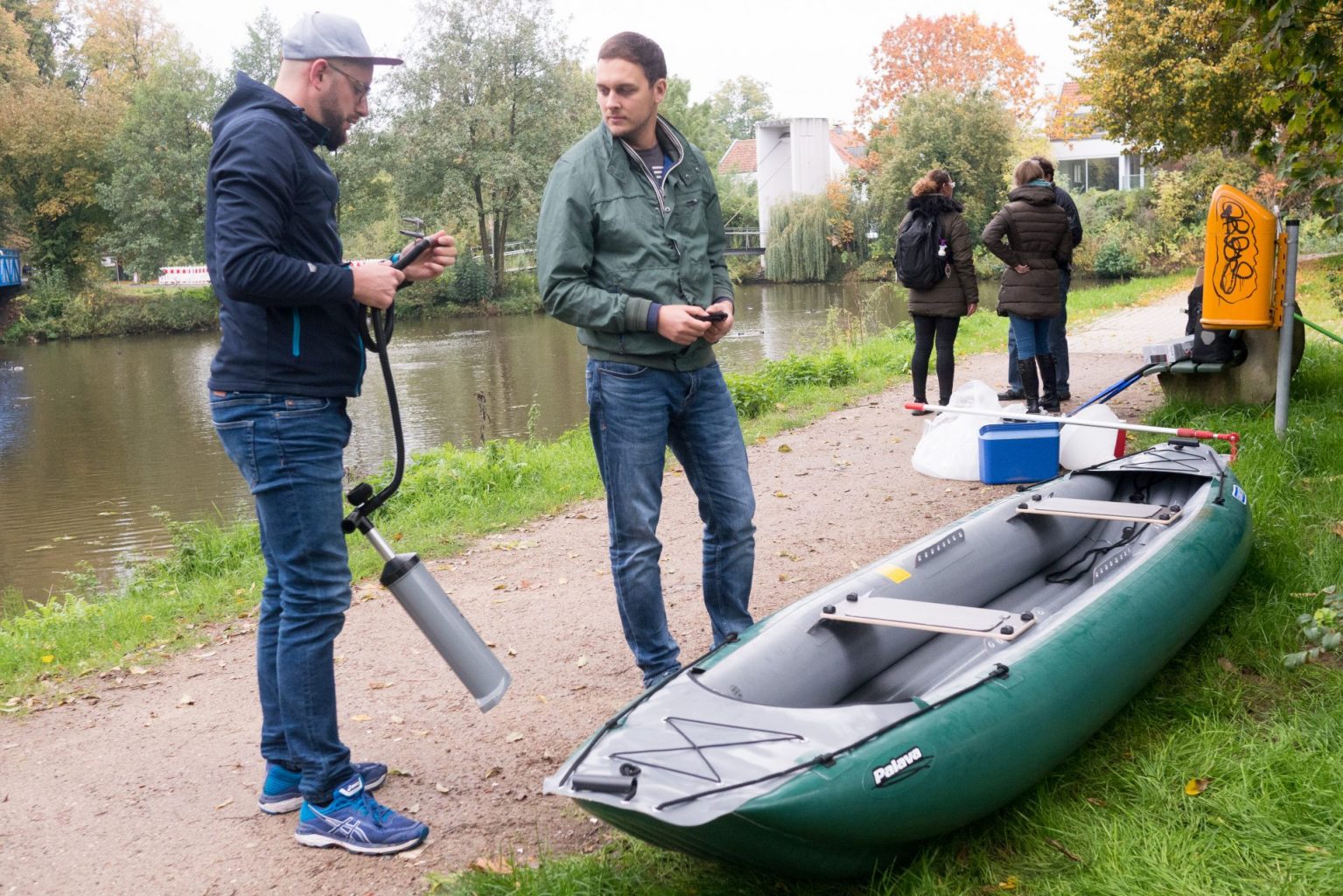
Arjen Hoekstra (1967 – 2019)
25.11.2019 Death does not take away what we have created in life. We appreciate Arjen’s contribution to creating a better world, especially with respect to sustainable water management.
He leaves this to all of us, to us as his colleagues, to his wife and children, to the rest of the family and to his friends, and through his many publications he leaves to the world. Our memories of him are proof of the footprint he has left in us. The University of Twente also commemorates Arjen and offers the possibility of a digital condolence form.
The German/Dutch MEDUWA project coalition.
All Partner Meeting during the Antibiotic Awareness Week
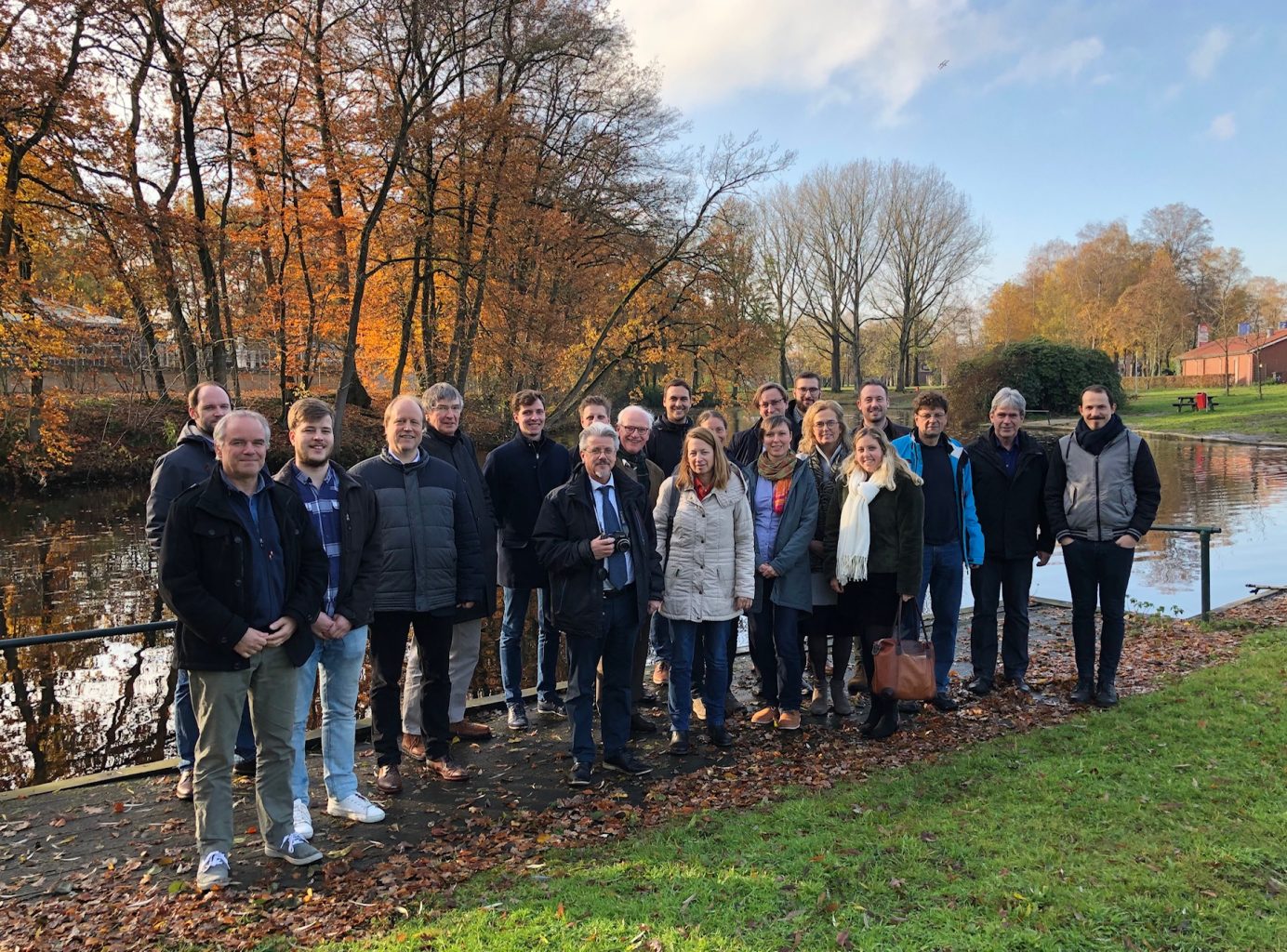
22.11.2019 The MEDUWA-Vecht(e) project is active during the Antibitiotic Awarness Week of the WHO and that cross-border! And this with our All Partner Meeting at the Euregio. The meeting offers a special opportunity for all project partners to share their latest results and take the next steps for the early completion of the project and beyond.
MEDUWA at ” There is only one health” – Crossborder AMR Prevention – Symposium
22.10.2019 as part of the EurHealth-1Health project, the OneHealth symposium “Er is maar een gezondheid / Es gibt nur eine Gesundheit- Crossborder AMR Prevention” will take place 29 October 2019 in Lingen. The MEDUWA project partners Dr. Heike Schmitt, Dr. Jörg Klasmeier and Dr. Lucia Hernandez-Leal present their insights from the transboundary MEDUWA Project on resistant bacteria and antibiotic resistance in the Vechte basin. Further information can be found in the programme and the invitation.
Last MEDUWA-Vecht(e) Stakeholder and Partner Meeting will be held in Zwolle on 12 and 13 February 2020
German fund opens door for Dutch R&D
Dutch pharmacists’ magazine shows renewed interest in medicines in the environment
17.7.2019 Once again, the Pharmaceutisch Weekblad publishes articles on environmental pollution by medicines. In May 2019, the MEDUWA approach was mentioned in an article on the new EU Strategy for Medicines in the Environment (Dutch); and in August 2019, MEDUWA will be referenced in an article on the development of environmentally responsible medicines.
WIS User Session at University of Osnabrueck
14.06.2019 On June, 19th there will be a WIS/GREAT-ER workshop at the university of Osnabrück for the partners of the MEDUWA project. The general aims of the workshop are that participants gain a broader understanding of GREAT-ER (Geography-referenced regional exposure assessment tool for European rivers) and the WIS (watershed information system).
The WIS developed by Geoplex is one of the innovations developed in the context of MEDUWA. It is designed to be a platform to inform stakeholders about the current status of pharmaceuticals in the Vecht catchment. Currently, this information includes mainly data concerning a beforehand chosen set of 15 reference compounds and their predicted concentrations in the catchment. The predictions are made at the University of Osnabrück using the GREAT-ER model. By means of model predictions pharmaceutical concentrations can be assessed on catchment scale without comprehensive monitoring. Furthermore, different discharge conditions can be addressed (low flow, average flow). Once set up, the model can be used to evaluate different mitigation measures a priori (e.g. equipping a sewage treatment plant with an additional treatment stage, reduction of pharmaceutical consumption, …).
The best way to approach such a complex tool and to reduce the level of abstraction is to explore the model itself. At the WIS/GREAT-ER workshop the participants will do exactly this under the guidance of the partners of the University of Osnabrück and the coworkers of Geoplex.
Global Goals Event at HAN University of Applied Sciences in Nijmegen
23.05.2019 On May 22 2019 at the Global Goals Event at the HAN University of Applied Sciences in Nijmegen Stichting Huize Aarde organised a workshop about possible answers of the health care sector to the medicinal environmental cycle. The MEDUWA approach was presented. Participants (mainly from health care) were invited to approach the issue from economic, technical, social and ethical angles and to share what they could do themselves.
Lecture Green Pharmacy at Leiden University Medical Centre
21.05.2019 On May 20 2019 a lecture was given by Margarita Amador and Alfons Uijtewaal for pharmacy students at Leiden University Medical Centre about the need for a transition towards a sustainable pharmacy.
This was the second time such a lecture was given. The Master students showed much interest in the subject. A central issue raised by the students in 2018 was how green pharmacy looks like in countries that don’t have high tech water treatment installations etc.
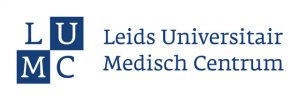

SETAC Europe 29th Annual Meeting
26.03.2019 From May 26 to 30 2019 the next Society of Environmental Toxicology and Chemistry (SETAC) conference will be held in Helsinki, see link. It’s a 5-day event featuring a variety of learning opportunities on emerging research, regulatory developments and the latest methodologies in environmental toxicology and chemistry. The conference will be visited by 2,000 to 2,500 scientists, assessors, regulators and managers from academia, business and government, representing an average of 60 countries. This meeting provides a unique networking opportunity and a chance for cross-collaboration long after the meeting.
Save the date: 19 June 2019: VVM Café Water pollution by medicines with Alfons Uijtewaal
31.01.2019 The Knowledge and Relationship Network for Environmental Professionals, VVM, organises an evening on water pollution by medicines: problems and solutions (in Dutch). After use, medicines and their transformation products end up in surface water via the toilet, sewage treatment plants, soil and air. Every year, enormous quantities are involved. What are the possible consequences for health and ecology? And what can water management contribute to a more effective approach? These questions guide the discussion during the VVM Café on this subject on 19 June. MEDUWA initiator Alfons Uijtewaal, Stichting Huize Aarde, will discuss the more general environmental aspects and the possible consequences for human health.
MEDUWA Innovation “plasma-activated water” supports the Green Deal “Medicines out of the water”
22.02.2019 Cathy van Beek, appointed sustainable care quartermaster by the Ministry of Health, Welfare and Sport, explains the possibilities of the care sector to tackle the third pillar of the Green Deal Sustainable Care “Medicines out of the Water”:
https://www.facebook.com/MEDUWAVechte/videos/399727014096393/?modal=admin_todo_tour
“The care sector can do a lot […] We need each other. You have to do it together: the care sector, the water sector have different languages and images of each other. Look for each other”. Cathy van Beek argues for a green formularium and solutions throughout the entire medicine chain: in addition to prescribing fewer medicines, there are also return actions and research on how medicines can be broken down in the water. As an example, MEDUWA partner and RUMC toxicologist Paul Scheepers gives the MEDUWA innovation “plasma activated water” to break down pharmaceuticals immediately after they are discharged in the toilet.
MEDUWA-Vecht(e) Stakeholder & Partner Meeting enters second round
21.02.2019 “Exchanging with the innovators” – With this as a guiding principle, the MEDUWA team invited this year’s participants to their Stakeholder & Partner Meeting on January 15th to the Denkfabrik Nordhorn at the lake side of Lake Vechte. Next to a presentation of the 12 innovations, further lectures and fora on the subject of medical residues and multi-resistant micro-organisms in the Vechte have provided food for thought on holistic solutions in practice. Read the Summary_MEDUWA-Vecht(e) Stakeholder Partner Meeting enters second round.Listen to more impressions of the stakeholder meeting in the following (German) NDR 1 broadcast of 15 January 2019:
Read more in the press release (in German) published by University Osnabrück.
MEDUWA in Pharmaceutic Weekblad
24.01.2019 Tackling the cycle of micro-pollutants such as medicines and resistant micro-organisms through soil, food, and water can only be achieved with multi-level measures in the entire medicine chain. With this in mind, the MEDUWA-Vecht (e) project was set up in 2017, a collaboration between 27 Dutch and German companies and institutions. This article is also available here: Frans van den Houdt, Addressing environmental damage with interventions throughout the medicine chain, Pharm weekbl 21 December 2018; 153-51 / 52 (in Dutch).
New article by MEDUWA partner Radboud University
10.01.2019 Read Radboud University’s latest published contribution to the MEDUWA project. Download the article: Duarte, DJ, Oldenkamp, R., Ragas, AMJ, 2019, Modelling environmental antibiotic-resistance gene abundance: A meta-analysis, Science for the Total Environment.
MEDUWA-Vecht(e) video
18.11.2018 Watch the MEDUWA-Vecht(e) videos to learn more about two MEDUWA innovations – Phytoremediation and Herbal Antibiotic Replacement
Sustainability cafe on ‘medicines from waste water’, lecture Ad Ragas, Nijmegen
15.07.2018 On Thursday, July 5, MEDUWA partner, Prof. Dr. Ad Ragas, Department of Environmental Studies Radboud University, gave a lecture on ‘medication in drinking water’ in the Marikenhuis in Nijmegen. Read more about the special edition sustainability café: ‘Preventing excess medication in drinking water‘.
Press release 1st MEDUWA Stakeholder and Partner Meeting
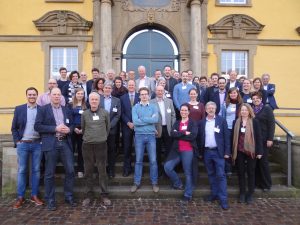
08.03.2018 The complex and increasingly debated issue of contamination in the environment by pharmaceuticals and multi-resistant micro-organisms is the subject of a transboundary innovation project at the Vechte River watershed in Germany and the Netherlands. The MEDUWA-Vecht (e) project (MEDicine Unwanted in WAter) is a consortium of 27 Dutch and German companies, universities, and governmental and non-governmental organizations developing a set of complementary techniques and methods to address this issue.
The contamination of soil and water by multi-resistant micro-organisms is a universal problem. Therefore, solutions directed at the entire lifecycle of these substances are needed. On Tuesday this week, the MEDUWA Vecht (e) project brought, for the first time, Dutch and German stakeholders from local and regional government agencies and NGOs concerned with human and environmental health together with project partners. The meeting that took place in Osnabrück was hosted by the lead organization of this innovation project, Osnabrück University. Read the PDF version of press release.
Cross-border project to limit medicines in water MEDUWA Article in H2O
08.01.2018 Alfons Uijtewaal, founder and co-coordinator of the MEDUWA-Vecht(e) project publishes an article on how we can limit the contamination of soil and water by medicines and multi-resistant micro-organisms in the river Vecht. Read more (article in Dutch).
Conference Green Pharmacy, University Medical Centre Utrecht
27.10.2017 The environmental cycle of medicines and multi-resistant micro-organisms is a motive for innovation in the human and veterinary medicine chain. The healthcare sector is looking for solutions to this societal challenge. During this symposium concrete options for action will be presented. MEDUWA is sponsoring this event and during the plenary and the poster sessions some MEDUWA-partners (Martien Graumans, RUMC, Rik Oldenkamp and Daniel Duarte, RU; and Willem Seinen, Alloksys BV) will present their work.
